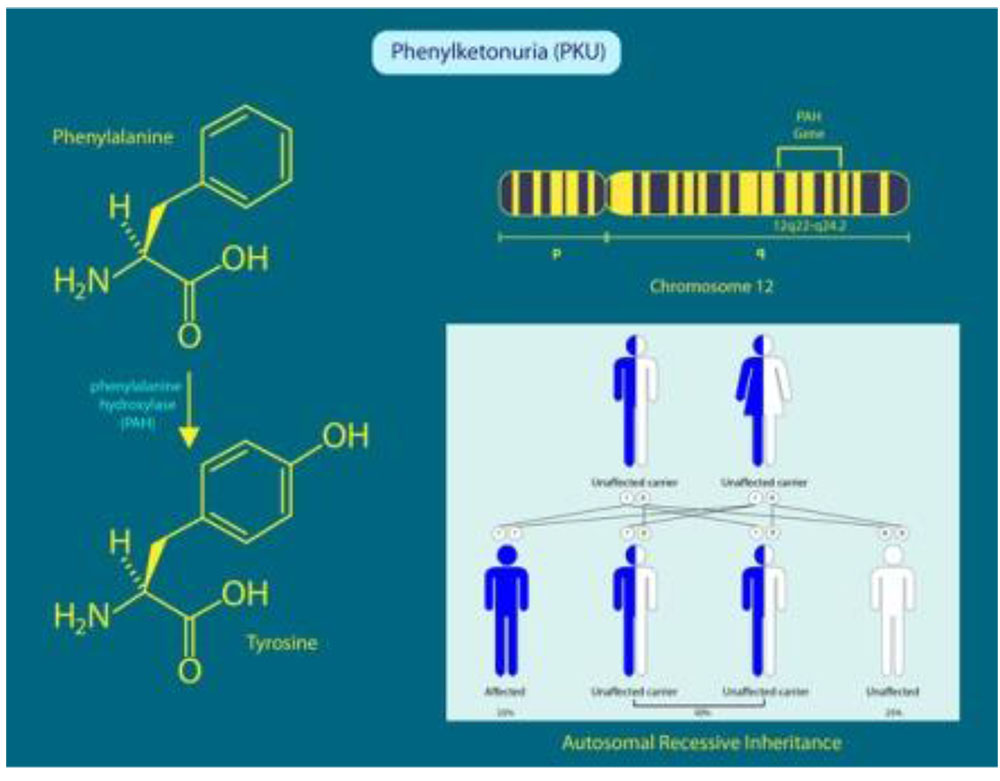- NEED HELP? CALL US NOW
- +919995411505
- [email protected]

Introduction
- Is a genetic disorder that is characterized by an inability of the body to utilize the essential amino acid, phenylalanine.
- It was discovered by the Norwegian physician Asbjorn Følling in 1934.
- It is called Folling’s disease.
- He discovered the disease when he tested the urine of two brothers when he found benzaldehyde and benzoic acid.
History
- Phenylketonuria was discovered by the Norwegian physician Ivar Asbjørn Følling in 1934 , Følling was one of the first physicians to apply detailed chemical analysis to the study of disease.
- In 1954, Horst Bickel, Evelyn Hickmans and John Gerrard published a paper that described how they created a diet that was low in phenylalanine and the patient recovered.
- 1951 Professor Horst Bickel develops the first effective treatment of PKU.
- 1957 Dr. Willard Centerwall develops "The Diaper Test”.
- 1958 Dr. Robert Guthrie develops "The Guthrie Test.
- 1966 The Guthrie Test becomes standard medical practice across the world.
- Bickel, Gerrard and Hickmans were awarded the John Scott Medal in 1962 for their discovery.
- Robert Guthrie introduced the newborn screening test for PKU in the early 1960s.
- Ireland was the first country to introduce a national screening programme in February 1966, Austria also started screening in 1966 and England in 1968.
- In 2017 the European Guidelines were published. They were called for by the patient organizations such as the European Society for Phenylketonuria and Allied Disorders Treated as Phenylketonuria
Cause
PKU is caused by a mutated gene for PAH enzyme due to defect in the biosynthis of cofactor tetrahydrobioptrin (BH4). The PAH gene is located on chromosome 12.Etiology
- Human phenylalanine hydroxylase converts the essential amino acid Lphenylalanine (L-Phe) into L-tyrosine using the co-factor (6R)-L-erythro5,6,7,8-tetrahydrobiopterin (BH4) and molecular oxygen.
- Any disruption in this mechanism can lead to Hyperphenylalaninemia.
- 99 of the mutations that disrupt this mechanism can be traced back to the PAH gene, 1 of the mutations are in the genes encoding the enzymes which are involved in the regeneration of the cofactor BH4, which is a vital co-substrate of PAH.
- BH4 is a cofactor of PAH and its regeneration is vital for the ongoing reaction.
- The PAH gene provides instructions for making an enzyme called phenylalanine hydroxylase. This enzyme converts the amino acid phenylalanine into other important compounds in the body. PAH gene variants result in the production of altered versions of phenylalanine hydroxylase that cannot process phenylalanine effectively. As a result, this amino acid can build up to toxic levels in the blood and other tissues. Because nerve cells in the brain are particularly sensitive to phenylalanine levels, excessive amounts of this substance can cause brain damage.

Inheritance
This condition is inherited in an autosomal recessive pattern, which means both copies of the gene in each cell must have a variant to cause the disorder. The parents of an individual with an autosomal recessive condition each carry one copy of the altered gene, but they typically do not show signs and symptoms of the condition.
Blood level
A normal blood phenylalanine level is about 1 mg/dl.
In classic PKU, levels may range from 6 to 80mg/dl, but are usually greater than
30mg/dl.
Prevalence:
Classic PKU and the other causes of hyperphenylalaninemia affect about one of every 10,000 to 20,000 Caucasian or Oriental births.
The incidence in African Americans is far less.
These disorders are equally frequent in males and females.
PKU prevalence is 1:12000in births
Types
There are different types of phenylketonuria (PKU) based on the severity of the diagnosis. Symptoms are worse among severe cases in those who are untreated. Types of PKU include:
- Classic PKU (most severe).
- Moderate or mild PKU.
- Mild hyperphenylalaninemia (least severe).
Symptoms
- Newborn infants develop signs of PKU within a few months of birth if untreated
- Mental retardation
- Behavioral or social problems
- Seizures, tremors or jerking movements in the arms and legs
- Hyperactivity
- Stunted growth
- Skin rashes (eczema)
- Small head size (microcephaly)
- Vomiting
- A musty odor in the child's breath, skin or urine
- Fair skin and blue eyes
Pregnancy and PKU
Women who have PKU and become pregnant are at risk of another form of the condition called maternal PKU.
If women don't follow the special PKU diet before and during pregnancy, blood phenylalanine levels can become high and harm the developing baby. Even women with less severe forms of PKU may place their unborn children at risk by not following the PKU diet.
Babies born to women with high phenylalanine levels don't often inherit PKU. But a child can have serious problems if the level of phenylalanine is high in the mother's blood during pregnancy. At birth, the baby may have:
- Low birth weight
- Unusually small head
- Problems with the heart
Treatment
- PKU is not curable.
- However, if PKU is diagnosed early enough, an affected newborn can grow up with normal brain development by managing and controlling phenylalanine ("Phe") levels through diet, or a combination of diet and medication.
- People who follow the prescribed dietary treatment from birth may (but not always) have no symptoms. Their PKU would be detectable only by a blood test. People must adhere to a special diet low in Phe for optimal brain development. Since Phe is necessary for the synthesis of many proteins, it is required for appropriate growth, but levels must be strictly controlled.
- Restriction of dietary phenylalanine is the most obvious treatment for this disorder and also the most prevalent.
- Phe is ubiquitous across a variety of food groups but is especially prevalent in proteins.
- A typical Phe-restricted diet would be rich in fruits and some amounts of potato and milk to maintain a phe concentration of about 2-6 mg/dL supplemented by a phe-free protein supplement.All kinds of meat, cheese and flour products are forbidden.
- Prognosis is fairly good if the diet is strictly followed into adulthood. Patients who discontinued after late adolescence.
- Other potential treatments being investigated are gene therapy, BH4 and phenylalanine lyase administration.




